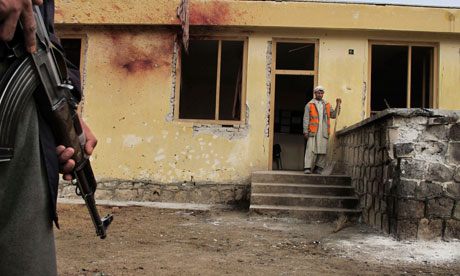Monday 21 February 2011 16.39 GMT
- Article history

More than 30 civilians were killed when a Taliban bomber targeted a meeting of US-sponsored militia commanders in the once-peaceful north of Afghanistan.
A further 40 were wounded in the attack near the entrance to a government centre in Kunduz province, raising the death toll from a recent insurgent bombing campaign to more than 100.
Those at the meeting say around 40 chiefs of the Afghan Local Police (ALP) force were at the district centre along with officials from the district of Emam Saheb when the bomber approached.
The bomber wanted to get inside but instead blew himself up in the queue outside, said Commander Maqsoom, leader of a 10-man ALP group.
He said most people inside the conference room were left unhurt and that the victims were ordinary citizens queuing for government papers.
"These attackers believe that they will be shaheed [martyrs] and go to heaven, but that's not true," Maqsoom said. "By killing Americans you will be shaheed, but not by killing ordinary people."
One provincial official said the office had been particularly busy in the run-up to the Afghan new year, with many parents requiring documents to enrol their children in schools.
The fact that just three police were among the dead highlights the heavy price increasingly paid by civilian bystanders.
The carnage in Kunduz will also sharpen concerns that the largely untrained and lightly armed militias are particularly vulnerable to attacks by insurgents.
ALP is Nato's preferred name for the controversial informal teams of gunmen it has been supporting, but which locals know as traditional tribal militias or arbikai.
Despite strong support for such auxiliary forces by top US commander David Petraeus, who regards them as an essential element of his campaign to roll back the Taliban, one Afghan official likened the militias to "shields of flesh".
Sami Kovanen, a private security analyst in Kabul, said the insurgents were clearly shifting strategy to counter Nato's multibillion-dollar efforts to rapidly build up the nation's army, police and irregular fighting forces.
"They want to demoralise these forces, particularly the young recruits with families who tell them to quit the police if it looks too dangerous," he said.
Two days before Monday's attack 38 people died when insurgent gunmen and suicide bombers targeted a Kabul Bank branch in the eastern city of Jalalabad when police officers were withdrawing their salaries.

No comments:
Post a Comment